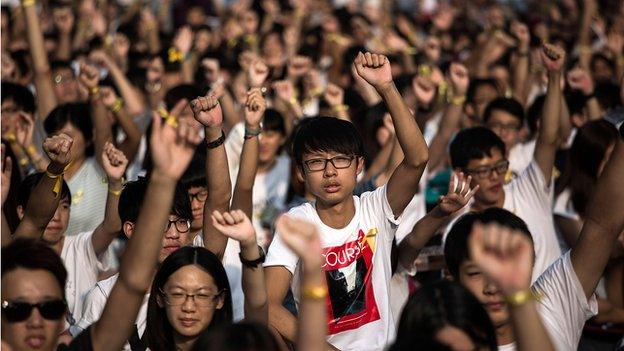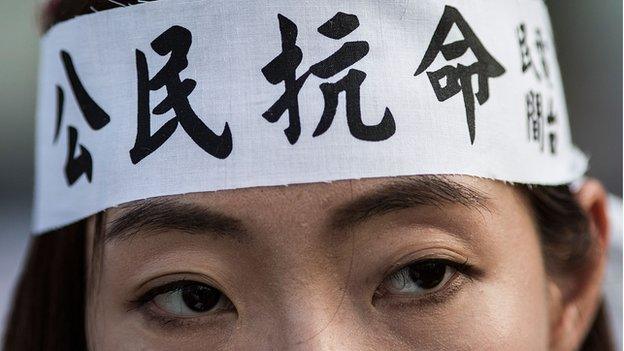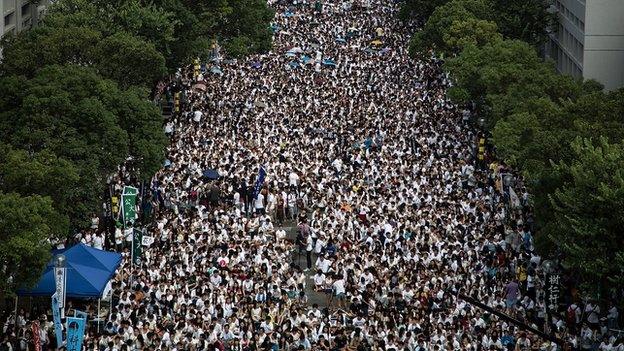Hong Kong's David and Goliath democracy battle
- Published

Students in Hong Kong want genuine universal suffrage for the special administrative region of China
"When dictatorship becomes a fact, revolution becomes a duty."
A T-shirt slogan seen in China this week. But this is not President Xi Jinping's T-shirt, nor is it merchandising from the Chinese Communist Party.
Instead the call to arms is emblazoned across the chest of a student in Hong Kong.
Thousands are boycotting classes this week, gathering instead on a university campus wearing yellow ribbons and waving placards; a determined but peaceful exercise in people power and all of them saying the same thing: "I want my voice to be heard. We want real democracy. Genuine universal suffrage for Hong Kong."
But T-shirt slogans reading '"dictatorship fact, revolution duty" have an uncomfortable ring to an avowedly revolutionary government.
Stability and prosperity
The fact is that on the eve of the 65th anniversary of China's communist revolution, political script lines have got strikingly muddled.
On the same day Hong Kong students were telling me they had to stand up and be counted, the leader of the party which came to power in 1949 promising justice for the workers and peasants was having his photo taken in Beijing with Asia's richest man, Li Ka-shing, and other Hong Kong tycoons, all of them insisting that stability and prosperity must come first.
The simple explanation is that in the six and a half decades since the founding of the People's Republic, China's communists have gone from being a party of revolution to one of reaction.
.jpg)
Asia's richest man, Li Ka-shing, and other Hong Kong business tycoons met President Xi Jinping in Beijing
On Hong Kong as on the mainland, they are the vested interest and jealous guardian of the status quo.
And as President Xi Jinping moves to close down all discussion of political reform in mainland China, tiny Hong Kong has become the last holdout for a fight over values.
David and Goliath
Historically Hong Kong has often been a change agent in the politics of China.
As far back as the 1911 revolution against the Qing imperialists, free speech and assembly under the British colonialists allowed China's first revolutionary hero Sun Yatsen to gather his disciples and marshal his arguments.
And now Hong Kong is in the spotlight again, not because its citizens are bidding to change the politics of the mainland but because some are locked in a David and Goliath battle of defiance, daring to complain that Beijing is breaking its promises.
The thousands of students sheltering under umbrellas from a hot September sun were too young to read the Basic Law in 1997 but they've read it since, and are confident in the convictions of their post-colonial education.
They believe they are entitled to autonomy, they take pride in Hong Kong's way of life, and they want the vote they've been promised in the leadership election of 2017.

A student wears a headband that reads ''Civil Disobedience'' at a rally outside Hong Kong's government complex on Wednesday
Beijing insists it is honouring its promises. On the last it insists its controversial plan for a committee to vet leadership candidates in 2017 is appropriate for Hong Kong because western style democracy with open nominations might produce chaos.
Local political allies like Elsie Leung agree. She was on the committee of China's parliament which drafted the election rules.
"What is good for the UK or the US may not be good for Hong Kong. We are not a city state we are a special administrative region of China."
"Social turmoil"
But the students insist Beijing's formula is sham democracy and warn that their strike may be followed by a wider campaign of civil disobedience.
Anson Chan, former chief secretary of the Hong Kong government and now a champion of greater democracy, says the crux of the argument is whether Hong Kong gets a leader accountable to its own public or to the communist government in Beijing.
"Unless you give legitimacy to the chief executive through genuine free elections, Hong Kong will become increasingly ungovernable and I'm afraid we are facing the possibility of social turmoil."

Some 13,000 students gathered at a university campus for the first day of the week-long boycott of classes
There is no turmoil yet. In fact when Xi Jinping looks at the photographs from Hong Kong this week, the sight of thousands of peaceful Chinese students sitting patiently under a hot sun asking politely for democracy may make him feel a little queasy.
The last time China saw such pictures was during the Tiananmen Square democracy protests 25 years ago and President Xi knows at least as well as anyone else that students have a special place in the political consciousness of China.
No surprise then that these resonant photographs from Hong Kong have not been published in mainland media. The last thing Xi Jinping wants is any mainland discussion about young idealists as "the conscience of the nation".
Prominent instead are photographs of President Xi meeting the Hong Kong billionaires. A source close to the meeting told me some felt uncomfortable about being "frogmarched to Beijing to echo the party line". But he said they had no choice because if they refused, they'd lose valuable business to mainland competitors.
"The students have values and whatever happens next, we look bad. We're going to end up on the wrong side of history."